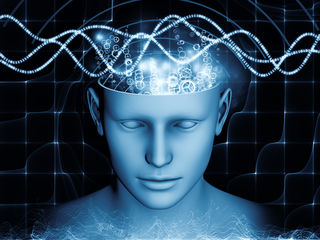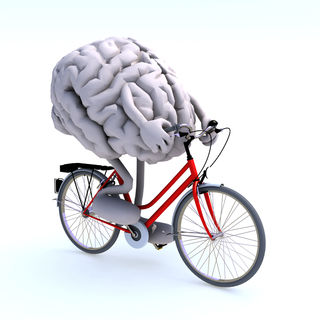Cognitive Benefits of Exercise Outshine Brain-Training Games
Cognitive Benefits of Exercise Outshine Brain-Training Games
New research shows that "brain-training" programs fail to boost working memory.

Source: agsandrew/Shutterstock
The underwhelming cognitive benefits of brain-training games were reaffirmed (yet again) in a new study led by Neil Charness, professor of psychology at Florida State University (FSU). Charness is a pioneering researcher and thought leader on lifestyle behaviors that help to preserve cognition as we age. He’s also Director of The Institute for Successful Longevity.
The latest paper by Charness and colleagues at FSU, “Evidence for Narrow Transfer after Short-Term Cognitive Training in Older Adults,” was published in the journal Frontiers in Aging Neuroscience. For this study, the researchers were curious to see if cerebral challenges—such as digital brain-training games, crossword puzzles, and Sudoku—improved everyday cognitive functions related to working memory, which is involved in complex reasoning, abstract thinking, processing speed, etc.
Walter Boot, who is also an expert on age-related cognitive decline at Florida State University, helped devise the protocol of this study. First, one group of participants played a brain-training video game called "Mind Frontiers" while another group of players performed crossword games or solved number puzzles. Second, the researchers tested if any of the games actually enhanced working memory.
Charness and Boot's findings debunk the myth that brain-training games improve cognition in a way that can enhance cerebral performance in other areas of your life. Yes. If you practice a specific game regularly, your mental dexterity and prowess at that specific game will improve. But the “far transfer” ability of brain-training programs to create other "real-world" benefits is minuscule because these games do not appear to improve working memory.

Source: Fabio Berti/Shutterstock
In a statement to FSU, Charness said, "I wouldn't come away from our article totally discouraged. It's another piece of the puzzle that we're all trying to assemble. It's discouraging in the sense that we can't find far transfer and that seems to be a fairly consistent finding in research. But if your real goal is to improve cognitive function and brain games are not helping, then maybe you are better off getting aerobic exercise rather than sitting in front of the computer playing these games."
After reading the latest FSU study and Charness’ statement, I reached out to him directly via email to dig deeper into the brain benefits of aerobic exercise. Additionally, I was curious to learn if he had any tips regarding an ideal “prescriptive dose” of aerobic exercise or physical activity that would result in the most cognitive benefits as someone gets older.
In my email I also wrote, “Neil Charness, do you have a personal hypothesis backed by specific empirical evidence that explains why aerobic exercise stimulates structural changes to the brain and boosts cognitive function better than brain-training games? Lastly, is there anything else about your research you’d like to share with Psychology Today readers?”
Neil Charness responded, “I don’t know that the issue is at all settled about effective dose and duration for getting the greatest benefit from aerobic exercise, but would point to the work on aerobic exercise by the University of Illinois at Urbana-Champaign group (Colcombe, Kramer, Behrer, and colleagues) for evidence about the benefits of frequent brisk walking for seniors (or at least, sedentary seniors). It’s not that brain training doesn’t work. It does improve what is trained, but the problem seems to be in showing general cognitive gains and far transfer. (As the 2016 review I was a part of, Do 'Brain-Training' Programs Work? makes clear.)"
Charness added, “The meta-analyses (e.g., Colcombe & Kramer, 2003; Smith et al., 2010) seem to be fairly convincing that such exercise is modestly effective for general cognition improvements (e.g., about a quarter to a half of a standard deviation in gain in cognitive abilities such as executive function compared to a control group). I’m not an expert on neurobiology, but the proposed mechanisms of neurogenesis, angiogenesis, and synaptogenesis to beef up brain functioning look plausible for explaining generalized gains in cognition. Maybe Wally Boot can chime in?”
A few minutes later, Wally Boot (who Charness had cc'd) sent me an email saying, "Kirk Erickson at University of Pittsburgh is probably the best person to speak to about specific mechanisms of aerobic fitness effects and dosage. He's done a number of intervention and longitudinal studies examining these issues, often employing functional and structural imaging methods, and also monitoring BDNF and other neuroprotective factors.”
For some background: I reported on Erickson's 2016 groundbreaking study which found a correlation between someone's total weekly caloric expenditure and increased gray matter volume in a Psychology Today blog post, "Want to Bulk Up Your Brain? Burn Some Calories Via Exercise." The takeaway of this research was that someone's weekly caloric expenditure via aerobic exercise could be seen on a neuroprotective continuum as marked by increased gray matter brain volumes in study participants over age 65.
Based on Boot's recommendation, I reached out to Erickson via email for comment on the FSU study. I wrote, “As a public health advocate who tries to give fine-tuned actionable lifestyle advice to my Psychology Today readers, the million-dollar 'holy grail' question remains: "What is the ideal prescriptive dose (duration and intensity) of aerobic exercise to optimize gray matter volume, white matter functional connectivity, and overall cognitive function at various stages of the human lifespan?"
Kirk Erickson responded, “This is the holy grail as you say and unfortunately, we don’t have a good answer for it just yet. In fact, I’m conducting a large 5-year study right now to try and tackle part of this question where we have three groups including a stretching and toning control group, a group getting 150 minutes per week and another getting 225 minutes per week of moderate-intensity exercise. It’s not an intensity manipulation, but it is manipulating the volume of activity over a 12-month period in older adults. The amounts might differ based on the population or health status of the individual… “
I also asked Kirk Erickson, “In terms of optimizing the neuroprotective benefits of physical activity (PA), do you think it matters if someone burns the same number of calories throughout the week doing easy leisure-time activity, moderate-to-vigorous physical activity (MVPA), or high-intensity interval training (HIIT)?”
Erickson responded, “Unfortunately, we really don’t know much about dose-response except that we think for most people (who are generally relatively inactive) more is better. Of course, there will be a plateau of improvements at some point. Hopefully, this answers a few of your questions (or points out how little we know right now). Thus, the need for more research and research funding.”
As a side note: This morning, while I was writing this Psychology Today blog post, my 80-year-old mother, “Jo Jo”, called to check in. My mom lives alone in a small New England two-story “saltbox” house in the Berkshire mountains of Western Massachusetts. While we were on the phone, I realized it was a perfect opportunity to have someone who is a "senior citizen" in her 80s weigh in on Charness' latest finding.
During our conversation, I decided to find out if my mother could anecdotally corroborate the latest FSU empirical findings based on her life experience. I asked my mom, “What do you think of brain-training games? How much exercise and what types of physical activity do you think create an optimal “tonic level” of psychological and physical well-being?"
Jo Jo responded, “I have fun using brain-training programs and playing solitaire on my iPad for entertainment. For me, they’re just games that prevent me from getting bored. I don’t think they really help to keep me mentally sharp. And most of the games become too easy, too quickly once I've played them a few times."
Regarding a "tonic level" of exercise, my mom said (in an exasperated tone), "Chris, you know I hate thinking of exercise as a chore I "have to" do. For me, the secret to staying active is planning daily activities that are psychologically rewarding and inadvertently involve moving around and staying connected with friends such as driving to Boston for my book club, being outside with my plein air painting group, making pottery ... And staying politically active by doing things like going to the Women’s March in Washington with your sisters, which reminded me of the 1960s and made me feel young again ... Also, I refuse to pay someone to shovel my driveway, rake leaves out of the gutters under my roof, or heed my doctor's advice to stop going up and down the stairs in my house for fear that I might fall. Forget it!! If I stopped doing my own yard work, taking to the streets in nonviolent civil disobedience or climbing the stairs in my house, I’d lose my sense of self-reliance and feel like an old softie who'd lost her gusto.”
Serendipitously, my mom’s self-discovered recipe for staying mentally sharp and young at heart fits a textbook pattern of lifestyle choices that Harvard University researchers have identified as being linked to “Super Agers." In 2016, Lisa Feldman Barrett and colleagues at Harvard’s Mass General Hospital reported in the Journal of Neuroscience that superagers appear to grin and bear it despite the unpleasant "ouch factor" of pushing against one's physical or mental limits. Notably, their white matter integrity and gray matter volumes stay remarkably young looking on brain scans.
Regardless of physical discomfort or straining to solve a tough problem, Barrett found that superagers seem to "stick with it" and are reluctant to give up. They refuse to throw in the towel easily and continue to wrestle with any given challenge until they've completed the task at hand. Barrett makes the analogy that superagers approach uphill battles and struggle much like a Marine who is tough-as-nails.
In closing, it appears that the million-dollar question, "What is the most effective dose of physical activity for generating optimal brain benefits?” won't be answered or agreed on by experts anytime soon.
That being said, anecdotal and empirical evidence suggests that the triad of (1) regularly kickstarting any type of physical activity that expends calories throughout the day; (2) social connectedness and being part of a grassroots community; (3) maintaining a “chutzpah mindset” in which you continually nudge against your limits are more likely to increase your odds of having a "super ager" brain as you get older than just sitting at home playing "brain-training" games.

